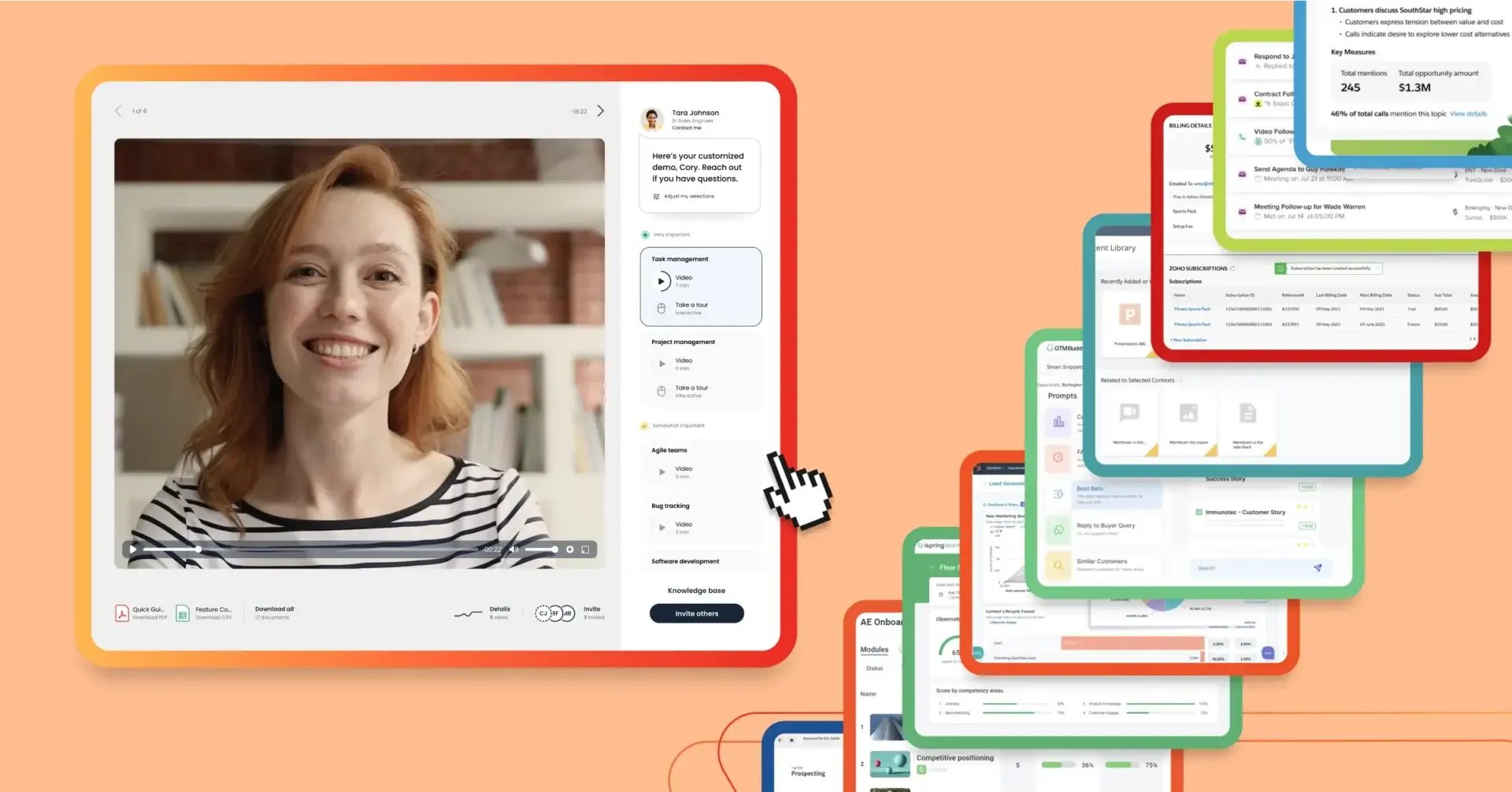Close more deals with
Demo Automation.
Watch a Demo
The average quota attainment for B2B sales organizations is a rather dismal 47%. How can you give your own sellers a leg up? The answer lies in sales enablement tools.
Companies using sales enablement tools are 19% more likely to see an increase in their win rate each year. But which sales enablement tools will give your sellers the boost they need?
Let’s talk about the best sales enablement tools available today and how they can help.
Best Sales Enablement Tools: Quick Overview
Consensus: Demo automation
Salesloft: Buyer intent signals
GTM Buddy: AI coaching
Zoho CRM: Cloud-based CRM
Membrain: CRM with productivity tools
Salesforce: Advanced CRM
HubSpot: Free CRM
iSpring Learn: Learning management solution
Highspot: AI-enabled training and coaching
Mindtickle: Individualized custom learning paths
Allego: AI-driven content, training, and coaching management
Seismic: Content and learning initiative creation
SalesHood: Content and learning tracking
Showpad: Content and learning management
Guru: Knowledge management
PandaDoc: Document management
DocSend: Document sharing
Storydoc: AI content creation
SharePoint: Document collaboration
Intercom: Customer service support
Outreach: Pipeline management
Gong.io: Conversation intelligence
ZoomInfo: Buyer intelligence
Dealfront: EU sales intelligence
Chorus: Conversation intelligence
What is Sales Enablement?
Sales enablement is the process of providing sales teams with the training, information, content, and tools they need to better engage with potential buyers and drive more conversions. Companies that focus on developing their sales enablement strategy and providing their sales teams with the right sales enablement tools see shorter sales cycles, bigger deal sizes, and more closed deals.
What is a Sales Enablement Tool?
A sales enablement tool is a type of software that provides training, content, information, and other material to all salespeople in your company in one centralized location. While there are different types of sales enablement tools that serve diverse purposes, the ultimate goal of a sales enablement tool is to make sales teams more efficient and prepared.
Types of Sales Enablement Tools
Types of sales enablement tools include:
- Sales engagement: These tools let sellers engage with buyers through their platform.
- Sales content management: These tools provide a place to store, manage, maintain, and send content.
- Sales intelligence: These tools give sellers insights into potential buyers.
- Sales intent: These tools help qualify leads.
What to Look For In Sales Enablement Software
Today’s sales enablement tools make your sales processes more efficient, save sellers time, and boost your overall buyer relationships. Here’s what to look for to choose the best tool.
Workflow Automation
Workflow automation helps reduce the amount of time sellers spend on manual tasks—which is essential as today’s sellers only spend 30% of their time actually selling. Sales enablement tools can automate outreach and engagement workflows, a vital time-saver and another reason why salespeople love sales enablement tools.
Easy Integrations
Nearly 70% of salespeople also say they’re overwhelmed by their tech stack. By using a sales enablement tool that has easy integrations, you can better consolidate your tech stack.
Customization Options
Sales enablement can look different for every company. By using a tool with customization options, you can ensure that the software you choose fits your goals and brand identity.
Ease of Use
Sales enablement’s job is to make selling easier and make sellers more productive. A sales enablement tool that isn’t easy to use and doesn’t have an intuitive interface isn’t fulfilling that job.
Advanced Analytics
More advanced analytics means more insight into your buyer, their intent, and their engagement level. You’ll also learn what type of content gets the most engagement, which improves your selling process.
Best Sales Enablement Tools for Buyer Engagement
These sales enablement tools focus on providing sellers with the information they need to determine who to engage with, when to engage with them, and how.
1. Consensus

Consensus is a one-of-a-kind sales enablement tool designed to create an engaging, educational, personalized buyer journey. With the help of AI, Consensus’s interactive product tour software lets you create interactive product tours with winning video demos, dynamic product content, and all the assets you need to make buying simple—both for your buyers and your sellers.
Your buyers tell Consensus what features they want to see the most, and then AI helps determine which of your demo experiences is best to provide them for conversion. Consensus empowers buyers to share their demo with key stakeholders and become your champions. You boost your stakeholder discovery—which is essential when the average B2B buying experience includes six to 10 stakeholders.
As your champions and stakeholders go through their product tours, you receive vital intent data. You’ll see who is viewing your tours, which demos are watched multiple times, who is sharing them, and much more. Consensus users see shorter sales cycles, bigger deals, more deals—and overall better relationships with their buyers.
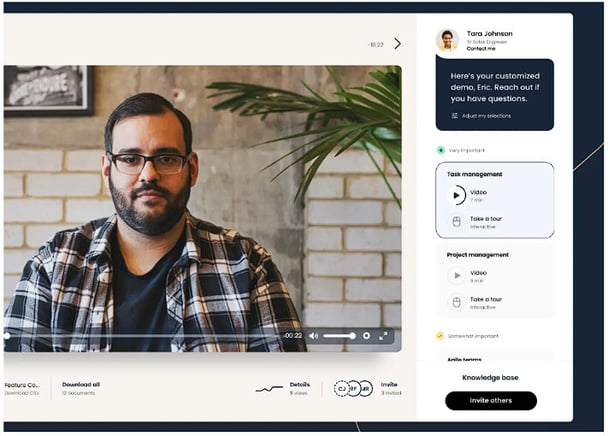
What’s available:
- Demo Creator: Create personalized demos at scale for every stage of the buyer journey (with AI assistance).
- Automated Product Simulations: Create clickable product simulations (at scale) using Consensus AI to give buyers a data-rich, self-guided way to explore features without needing a live environment.
- Demolytics: Track how your buyers are engaging with your demos to receive intent data that helps you better qualify and interact with your leads.
- Screen Recorder: Capture and edit video demos right through Consensus.
- Chrome Extensions: Create video demos instantly with the help of Consensus’s Chrome Extensions, going beyond screenshots to build a more interactive experience.
- Demo Player: Deliver interactive demos on any browser or device.
- DemoBoards: Provide your buyers with a secure, branded, and customized landing page that shows off your product.
- Playlists: Share multiple product experiences in one link, keep content relevant, and guide buyers throughout their journey.
- BuyerBoard: Give your champions a place to show your product to key stakeholders and colleagues.
- Content Downloads: Supplement your automated demos with additional content that can be easily downloaded by your buyers.
- Public Links and Merge Links: Create custom links that can be shared via your social media, email campaigns, website, and more.
- Demo Library: Build a centralized AI-powered hub for your demos that’s accessible to your team and easily searchable.
What’s not:
- This product focuses on the buyer journey, so it’s not an ideal fit for companies who need onboarding software
- Best for enterprise and mid-market companies with established SA teams
Pricing:
- Starter: $600/month
- Pro: $1250/month
- Enterprise: Consensus offers custom pricing tailored to your team’s size and needs. Contact Consensus to request a personalized quote.
2. Salesloft

Salesloft is a sales enablement tool focused on revenue growth. The platform utilizes AI to unearth buyer signals through analytics tracking and conversation intelligence. It then sends GTM teams tasks and information to move buyers down the sales pipeline.
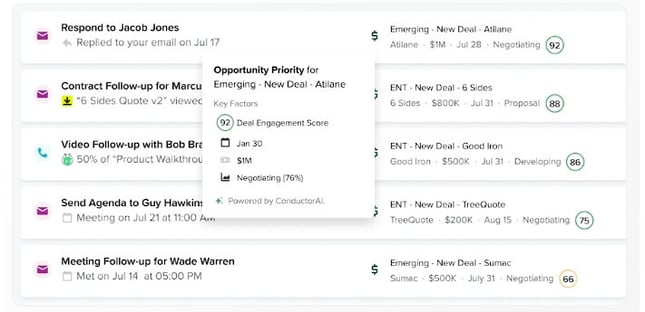
Photo courtesy of Salesloft
.What’s available:
- Rhythm: Salesloft’s AI tool that reads buyer signals.
- Plays: Automated one-off tasks based on buyer signals.
- Conversation intelligence: Track and analyze buyer conversations.
- Forecast: Use AI to predict future revenue.
What’s not:
- Limited conversation intelligence tracking
- Challenging integrations
- Limited customization options
Pricing: Salesloft has two pricing plans: Advanced and Premier. Both have custom pricing.
3. GTM Buddy

GTM Buddy uses AI to assist with multiple facets of sales enablement. Users can receive tips for potential sales plays, role-play with AI for training and coaching, and get actionable insights from buyer engagements with content and digital sales rooms.
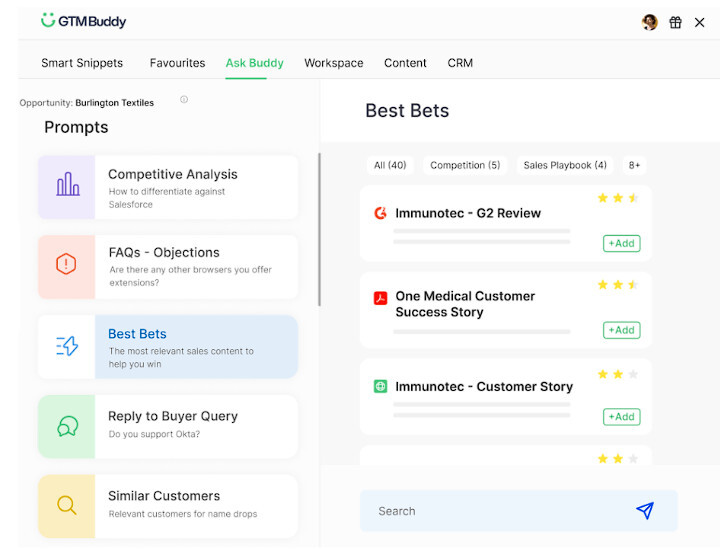
Photo courtesy of GTM Buddy
What’s available:
- Sales assistant: AI delivers immediate answers, selling guidance, and email writing assistance.
- Content management system (CMS): Manage, deliver, and analyze content in one place.
- Learning management system (LMS): Train and coach sellers in one place.
- Digital sales room: Create a secure place to share content and interact with buyers.
What’s not:
- Unnecessary notifications that can’t be removed
- Steep learning curve
- Complex features
Pricing: GTM Buddy doesn’t publicly display pricing.
Best Sales Enablement CRMs
Sales enablement doesn’t end when a deal closes. These sales enablement tools focus on creating one place for managing the lifecycle of a customer relationship—from the first interaction to after they’ve become your longtime champion.
1. Zoho CRM
![]()
Zoho CRM is a cloud-based customer relationship management (CRM) platform with features for sales, marketing, and customer success teams. It lets users create customized buyer journeys, generate quotes, access sales scripts, and predict deal closure rates.
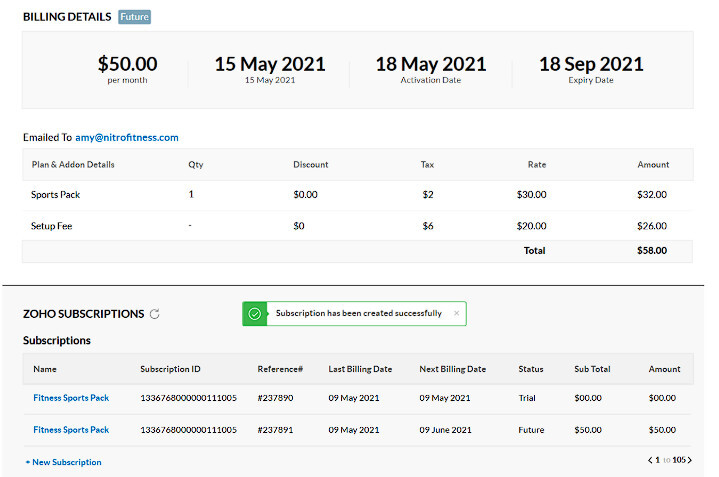
Photo courtesy of Zoho CRM
What’s available:
- Zia: Zoho CRM’s AI assistant that offers deal prediction, answer assistance, and sales suggestions.
- Blueprints: Build, implement, and review sales processes.
- Path Finder: Identify customer behavior and pain points to create a customized customer journey.
- Partner Portals: Let partners add channel leads directly to the sales pipeline.
What’s not:
- Poor customer support
- Steep learning curve
- Buggy interface
Pricing:
- Standard: $20 per user per month
- Professional: $35 per user per month
- Enterprise: $50 per user per month
- Ultimate: $65 per user per month
2. Membrain

Membrain is a B2B growth platform that offers a CRM, as well as built-in productivity tools. In addition to CRM capabilities, the platform provides content management, engagement playbooks, sales analytics, and email integration with templates.
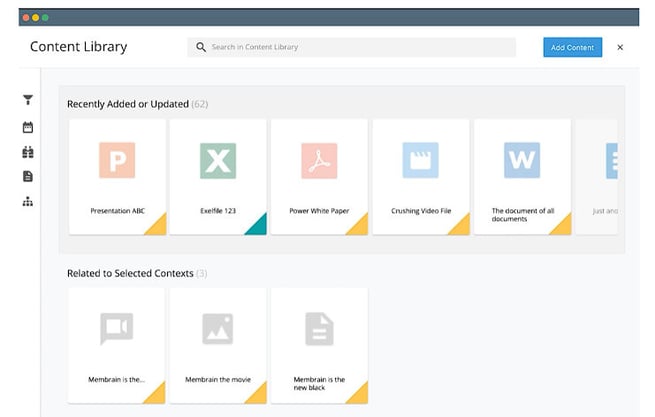
Photo courtesy of Membrain
What’s available:
- Content Hub: Stores, organizes, and recommends content.
- The Beacon: Gathers insights when prospects interact with a website and adds new prospects to the CRM.
- Automatic prospect assignment: Use automation tools to assign prospects based on multiple factors.
- Revenue forecasting: Predict future revenue by current sales projects and recurring subscriptions.
What’s not:
- Broken integrations
- Limited email integration features
- Limited analytics
Pricing:
- Prospecting: $49 per user per month
- Active Pipeline: $69 per user per month
- Account Growth: $89 per user per month
- Elevate: $299 per user per month
3. Salesforce
Salesforce is an AI-enabled CRM with a suite of tools for marketing, sales, and customer success. Users can receive AI assistance with lead scoring, lead nurturing, account research, content creation, coaching, conversation intelligence, and revenue forecasting.
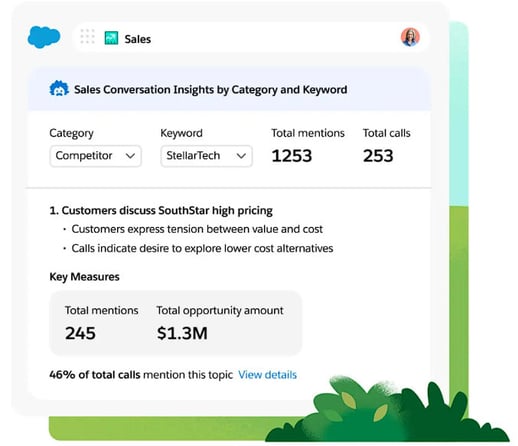
Photo courtesy of Salesforce
What’s available:
- Einstein Conversation Insights: Saleforce’s AI bot, Einstein, utilizes conversation intelligence to automate tasks and connect with customers after calls.
- Activity capture: Automatically capture and sync relevant customer and sales data.
- Buyer assistant: Use AI-powered conversations to connect with buyers.
- AI scoring: Einstein can identify leads most likely to convert.
What’s not:
- Steep learning curve
- Expensive CRM solution
- Features vary by custom pricing plan, so users may have limited feature options
Pricing: Salesforce pricing varies by use case and number of users.
4. HubSpot

HubSpot is a customer platform with tools for marketing, sales, and customer service, including a free CRM. The CRM comes with features like an AI-assisted email writer, live chat software, and a meeting scheduler.
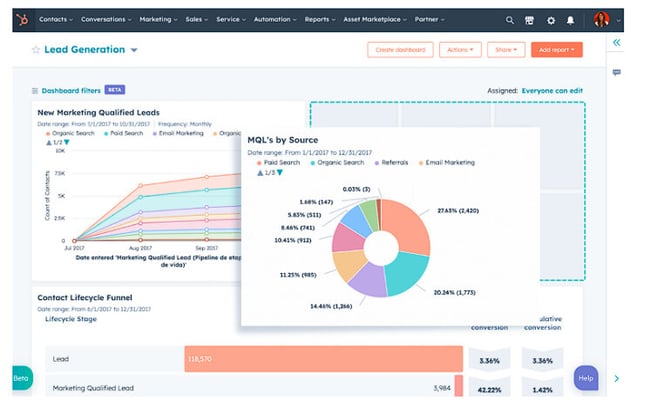
Photo courtesy of HubSpot
What’s available:
- Business insights: Automatically populate contact records with company insights.
- Email tracking: Get notifications as soon as a lead interacts with an email.
- Lead ads: Create Facebook and Instagram lead ads that automatically capture contact information.
- Contact activity: See all interactions a contact had with a website in one place.
What’s not:
- Free CRM features are very limited, so users must pay for the more advanced Smart CRM for more tools.
- Limited customization options
- Limited automated features
Pricing: HubSpot has a free CRM. Pricing for additional features depends on the use case and number of users.
Best Sales Enablement Tools for Training and Learning
These sales enablement tools focus on the teaching, training, and coaching parts of sales enablement.
1. iSpring Learn

iSpring Learn is a cloud-based LMS. It provides one location to store all learning content, follow training courses, run reports on employee performance, and track updates at the corporate office.
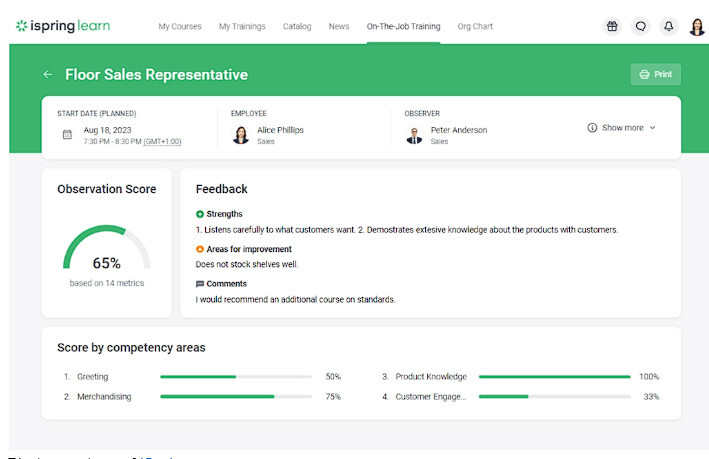
Photo courtesy of iSpring
What’s available:
- 360-Degree Performance Appraisal: Complete performance review sessions.
- Corporate Portal: See all company information, news updates, and event announcements in one place.
- Training management: Automate training paths.
- Content management: Store content in one library.
What’s not:
- Complex onboarding
- Steep learning curve
- Limited integration options
Pricing:
- 100 users: $6.64 per user per month, billed annually
- 300 users: $4.10 per user per month, billed annually
- 500 users: $3.75 per user per month, billed annually
- Custom pricing plan
2. Highspot

Highspot is an AI-enabled sales enablement tool that offers sales training and coaching. Personalize training paths, deliver real-time coaching feedback, automate content creation, and get insights from enablement analytics and conversation intelligence.
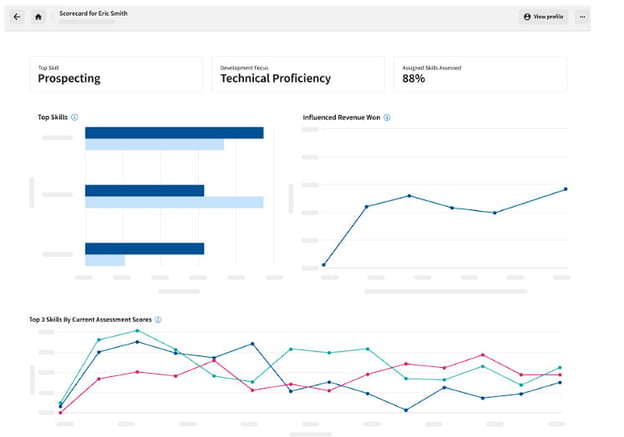
Photo courtesy of Highspot
What’s available:
- Conversation intelligence: Receive AI-generated meeting summaries and sentiment analysis.
- AutoDocs: Use AI to generate custom documents.
- Sales playbooks: Build sales playbooks with a drag-and-drop template.
- AI-integrated training: Utilize AI to deliver feedback, knowledge checks, and answers to employees.
What’s not:
- Steep learning curve
- Non-intuitive interface
- Challenging to find needed features
Pricing: Highspot does not publicly display pricing.
3. Mindtickle

Mindtickle takes an individualized approach to sales training and coaching, creating custom learning paths. It also offers content management, sales and sales enablement analytics, and conversation tracking.
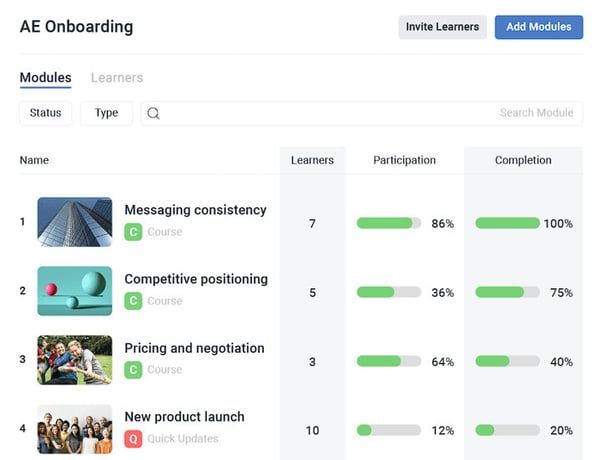
Photo courtesy of Mindtickle
What’s available:
- Sales Readiness Index: Identify an Ideal Rep Profile to measure rep preparedness.
- Conversation intelligence: Track conversations and receive insights.
- Digital Sales Rooms: Connect with buyers in one customized place.
- CMS: Manage all content in one place.
What’s not:
- Non-intuitive interface
- Steep learning curve
- Time-consuming training courses
Pricing: Mindtickle doesn’t publicly display pricing.
4. Allego

Allego is a sales enablement platform that offers learning and content management capabilities. Sync and maintain sales content, receive engagement analytics, run AI-powered dialogue simulations for coaching, and deliver training with AI-enabled recommendations.
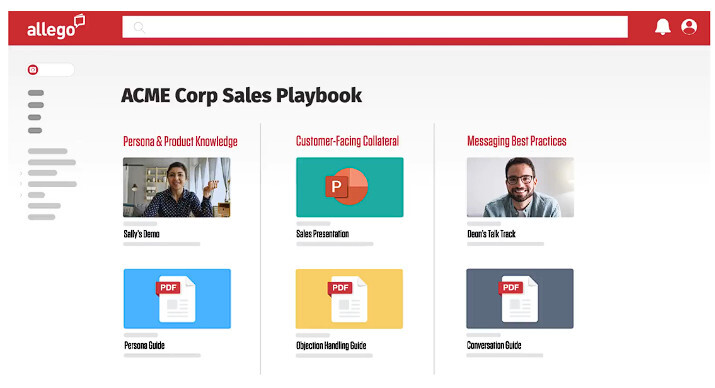
Photo courtesy of Allego
What’s available:
- Enablement AI: Use AI for search, actionable insights, and training recommendations.
- CMS: Store, sync, and maintain content in one place.
- Digital Sales Rooms: Interact with buyers in a customized virtual portal.
- Dialogue simulations: Run seller-buyer simulations for coaching.
What’s not:
- Features are limited unless the full suite is purchased
- Steep learning curve
- Non-intuitive interface
Pricing: Allego pricing is determined by the use case, features, and number of users.
5. Seismic

Seismic is a cloud-based enablement platform. Create and launch enablement initiatives, store and measure the effectiveness of content, build coaching programs, and automate content creation.
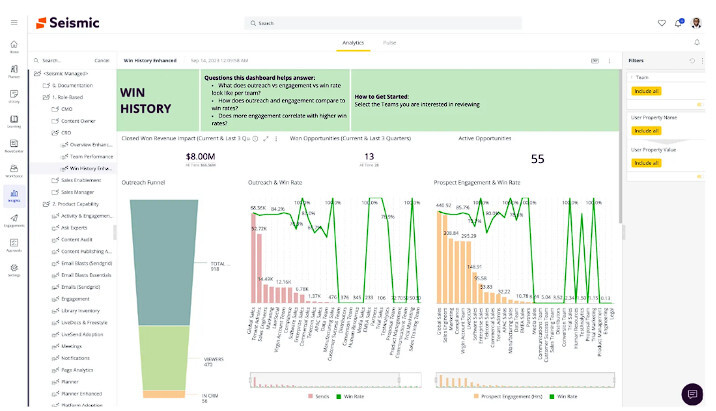
Photo courtesy of Seismic
What’s available:
- Seismic Learning: Create individualized learning paths.
- Seismic Programs: Build, launch, and scale enablement initiatives.
- LiveDocs: Automate content and presentation creation.
- Aura Copilot: Get immediate answers and actionable insights.
What’s not:
- Non-intuitive interface
- Struggle to find needed features
- Steep learning curve
Pricing: Seismic doesn’t publicly display pricing.
6. SalesHood

SalesHood functions as both a CMS and an LMS. Organize and share content, get AI-powered content recommendations, develop action plans for buyers and sellers, build custom learning paths, and track content and training engagement.
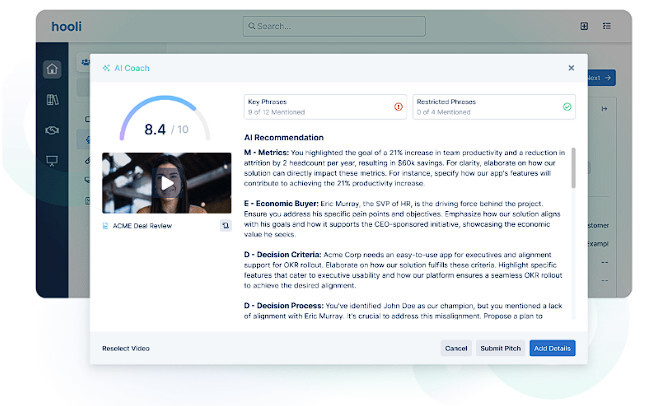
Photo courtesy of SalesHood
What’s available:
- AI Coach: Roleplay with AI.
- AI Deal Reviews: Measure deal readiness.
- Mutual Action Plans: Create action plans based on interactions in digital sales rooms.
- AI Call Recaps: Utilize conversation intelligence.
What’s not:
- Steep learning curve
- Non-intuitive interface
- Difficulty finding necessary documents
Pricing:
- Essential: $45 per user per month
- Pro: Custom pricing
- Transform: Custom pricing
7. Showpad

Showpad offers CMS and LMS capabilities with AI-enabled features. Get content recommendations, interact with buyers on a custom microsite, create continuous learning programs, and track content and learning analytics.
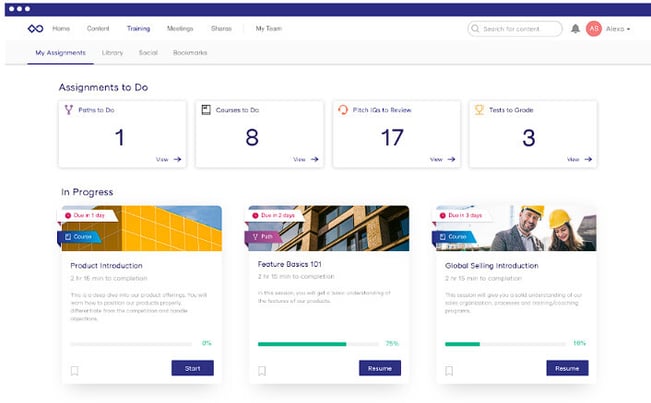
Photo courtesy of Showpad
What’s available:
- Shared Space: Use customized digital sales rooms.
- Showpad Coach: Develop and scale coaching programs.
- CMS: Store and sync content in one place.
- Content recommendations: Receive AI-generated content recommendations.
What’s not:
- Limited customization options
- Limited features depending on pricing plan
- Non-intuitive interface
Pricing: Showpad doesn’t publicly display pricing.
Best Sales Enablement Tools for Content Management
These sales enablement tools put the focus on storing, maintaining, syncing, sending, and tracking content.
1. Guru

Guru aims to create a single source of truth as a knowledge management platform. Store all information in one place, pulled from apps, docs, and chats, and then Guru finds the answers needed through AI.
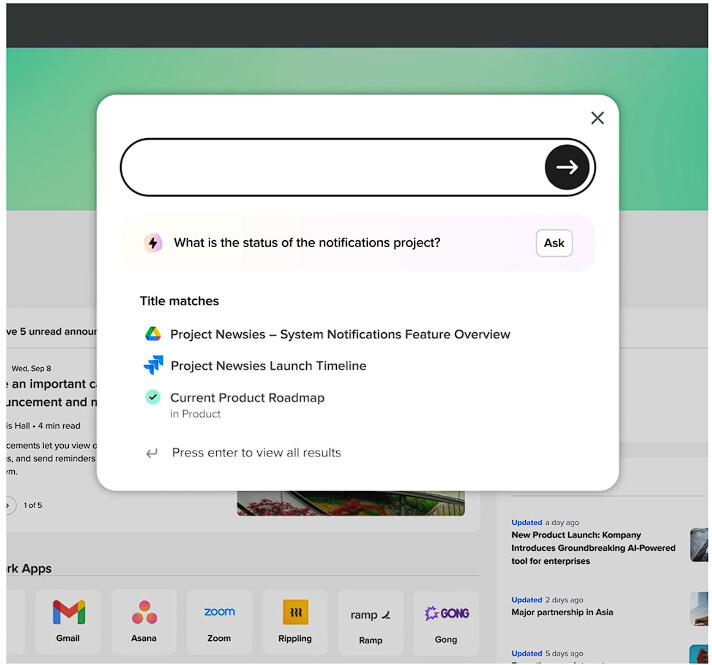
Photo courtesy of Guru
What’s available:
- Knowledge Agent: Configure AI models to give specific responses to questions.
- AI Training Center: Track questions, see frequently used sources, and edit answers.
- Guru GPT: Create AI-generated content.
- Custom Pages: Create personalized landing pages in the Guru dashboard.
What’s not:
- Limited search functionality
- Disorganized interface
- Buggy integration
Pricing:
- Free trial
- All-in-One: $18 per user per month
- Enterprise: Custom pricing
2. PandaDoc

PandaDoc is a document management system. Create and collaborate on documents with automated features. Capture signatures through the platforms, track the trail of the document, and embed payment gateways for customers.
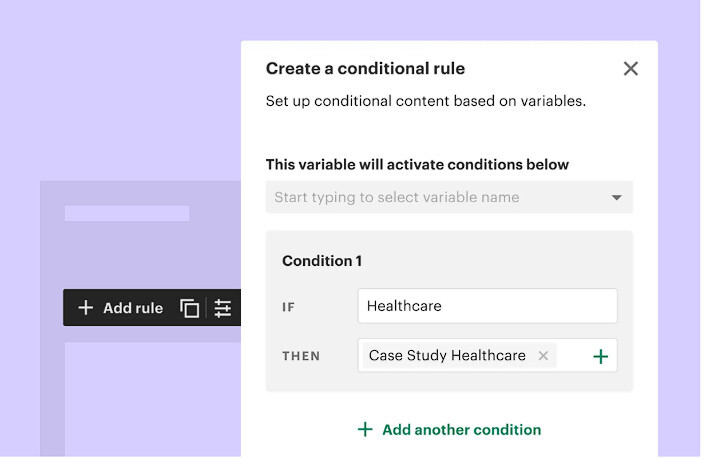
Photo courtesy of PandaDoc
What’s available:
- Smart Content: Create documents with automation tools.
- PandaDoc CPQ: Develop custom quotes.
- PandaDoc Rooms: Collaborate with buyers in virtual sales rooms.
- Workflow automation: Build processes for documents to automatically follow.
What’s not:
- Complicated signature process
- Limited customization options
- Non-intuitive interface
Pricing:
- Starter: $35 per user per month
- Business: $65 per user per month
- Enterprise: Custom pricing
3. DocSend

DocSend, which was acquired by Dropbox, is a document-sharing platform. Control document access, receive analytics on documents, automatically update files for all recipients, and share multiple documents in a single place.
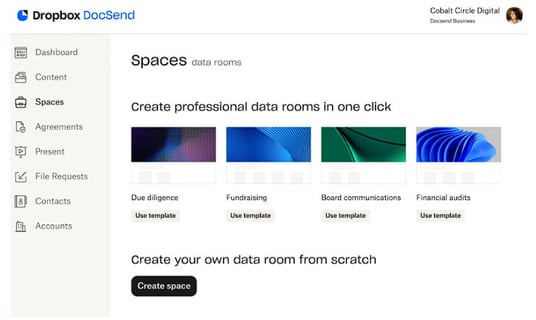
Photo courtesy of DocSend
What’s available:
- Access restrictions: Control file access with passcodes and email verification.
- Document analytics: Track how recipients interact with documents.
- Virtual data rooms: Pitch, analyze, and close deals in one virtual location.
- Client portals: Create a personalized portal for all documents and interactions with a client.
What’s not:
- Non-intuitive interface
- Document upload bugs
- Very limited features for less expensive pricing plans
Pricing:
- Personal: $15 per user per month
- Standard: $65 per user per month
- Advanced: $250 per month
- Advanced Data Rooms: $300 per month
4. Storydoc

Storydoc is a content creation tool. Create presentations, pitch decks, business plans, and more written and visual content. Generate content with AI and with premade templates, edit, share, and track.
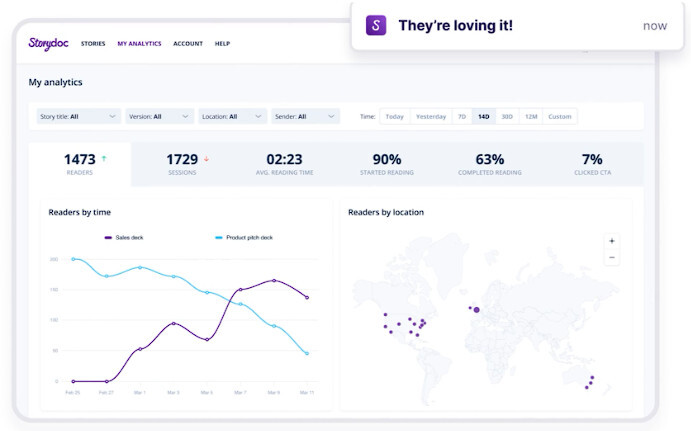
Photo courtesy of Storydoc
What’s available:
- AI Interactive Presentation Maker: Create interactive slide decks with AI.
- AI EPK Builder: Make interactive electronic press kits with AI.
- AI Business Plan Creator: Develop business plans with AI.
- Engagement analytics: Track content analytics.
What’s not:
- Inaccurate AI
- Buggy features
- Steep learning curve
Pricing:
- Starter: $40 per user per month
- Pro: $60 per user per month
- Team: Custom pricing
5. SharePoint

SharePoint, a Microsoft product, is a CMS that lets users upload documents, collaborate on them, and share them with people both inside and outside their organization. Users create intranet and extranet pages to share content.
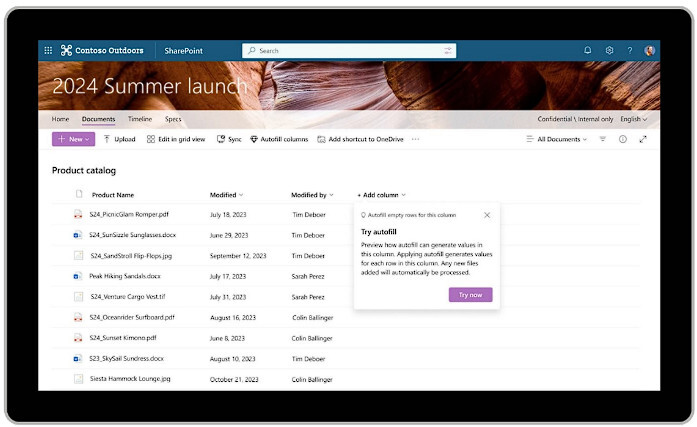
Photo courtesy of Microsoft
What’s available:
- Website generation: Generate intranet and extranet websites.
- Collaboration tools: Work with others to collaborate on documents.
- Document storage: Store documents securely.
- Integrations: Integrate documents into the Microsoft 365 suite and other tools.
What’s not:
- Inefficient search features
- Limited customization options
- Steep learning curve
Pricing: $5 per user per month or $12.50 per user per month for the entire Microsoft 365 suite
Best Sales Enablement Tools for Customer Service Support
A common misconception is that sales enablement is just for sales teams, but 50% of CSOs believe that enablement will support marketing and customer success in the next three years. These sales enablement tools help support customer success.
1. Intercom

Intercom is a customer service platform that’s AI-focused. It utilizes AI to answer questions and provide support to customers, support agents, and support leaders, integrated anywhere customer support works.
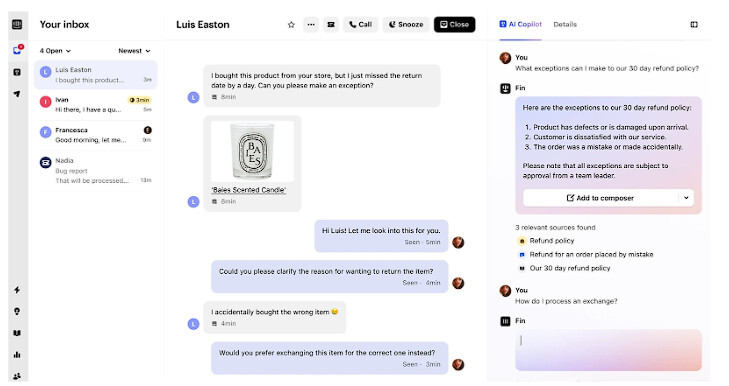
Photo courtesy of Intercom
What’s available:
- AI Agent: Provides instant answers to customers.
- AI Copilot: Offers immediate assistance to support agents.
- AI Analyst: Provides AI insights and recommendations.
- Workflow builder: Build automated workflows.
What’s not:
- Confusing chat functionalities
- Limited analytics
- Runs slowly
Pricing:
- Essential: $39 per user per month
- Advanced: $99 per user per month
- Expert: $139 per user per month
2. Outreach
Outreach is a sales execution platform for sales, customer success, and other RevOps teams. Forecast revenue, onboard and coach employees, and manage deals and pipelines with AI capabilities.
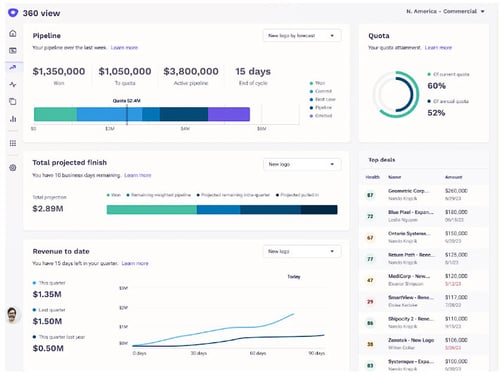
Photo courtesy of Outreach
What’s available:
- Mutual action plans: Develop transparent sales cycles with tasks for buyers and sellers.
- Conversation intelligence: Track and analyze conversations.
- Deal insights: Use AI to receive actionable insights into deals and pipelines.
- AI forecasting: Simulate revenue outcomes with AI.
What’s not:
- Integration issues
- Steep learning curve
- Trouble connecting numbers for conversation intelligence features
Pricing: Outreach doesn’t publicly display pricing.
Best Sales Enablement Tools for Buyer Intelligence
These sales enablement tools can be a handy addition to a tech stack in need of some help with prospecting, lead qualification, and pipeline management. They provide insights into buyers.
1. Gong.io

Gong.io, which perfectly integrates with Consensus, is a revenue intelligence platform that uses AI capabilities for forecasting, analytics, coaching, and improved buyer interactions. Detect customer trends, find the answer to any question across different accounts, and use prior interactions to improve coaching.
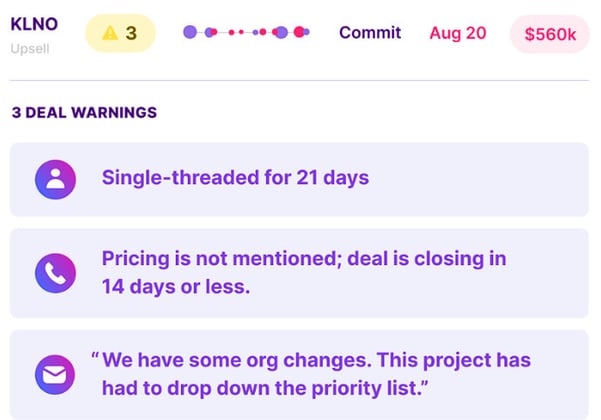
Photo courtesy of Gong
What’s available:
- Conversation intelligence: Track and analyze customer calls.
- Predictive forecasting: Use AI to find an accurate revenue forecast.
- Pipeline inspection: Get insights into pipeline struggles.
- Data capture: Automatically track and sync customer data.
What’s not:
- Inaccurate AI
- Call recording issues
- Difficult search functionality
Pricing: Gong creates custom pricing based on the number of users.
2. ZoomInfo

ZoomInfo enables users to prospect and engage customers in one place. Receive AI-driven insights into buyers, get recommended actions based on previous interactions, and automate workflows.
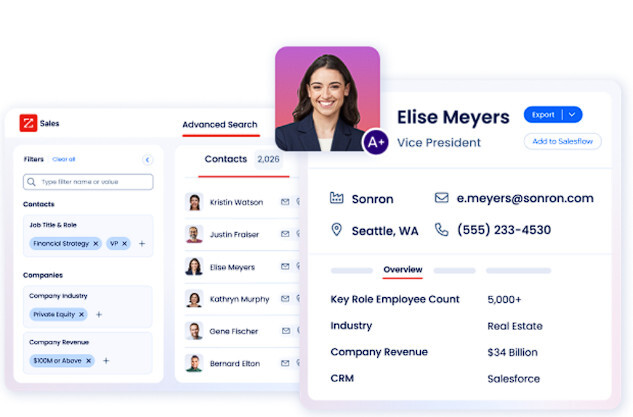
Photo courtesy of ZoomInfo
What’s available:
- Contact data: Access a B2B contact database.
- Buyer intent: Use AI to identify high-intent leads.
- Automated workflows: Automate outreach and sales engagement workflows.
- Conversation intelligence: Track and analyze customer interactions.
What’s not:
- Inaccurate contact data
- Outdated information
- Slow load times
Pricing: ZoomInfo doesn’t publicly display pricing.
3. Dealfront

Dealfront is a sales intelligence solution with a database of European companies and contacts. Build a list of prospects based on an ICP, capture leads from web traffic, clean company data in a CRM, and build advertising to target specific companies.
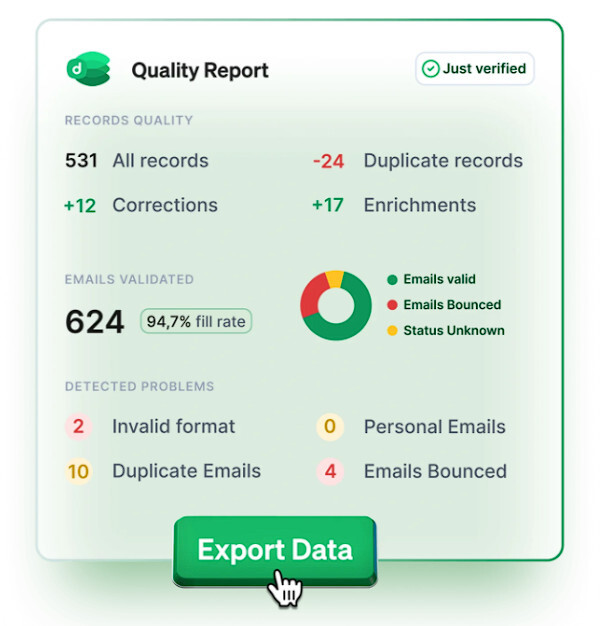
Photo courtesy of Dealfront
What’s available:
- Target: Find companies matching an ICP.
- Leadfinder: Connect with leads from web traffic.
- Datacare: Check, clean, and enrich company data in a CRM.
- Promote: Use IP-based B2B advertising to target a specific company.
What’s not:
- Built for European B2B companies
- Inaccurate data
- Challenging implementation
Pricing: Dealfront doesn’t publicly display pricing.
4. Chorus

Chorus is a tool from ZoomInfo that’s focused on conversation intelligence. Capture all calls, emails, and meetings to use for sales coaching, relationship management, and forecasting.
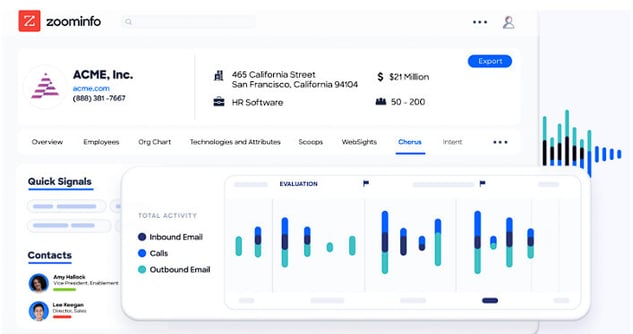
Photo courtesy of ZoomInfo
What’s available:
- Conversation insights: Transcribe meetings, calls, and emails and pull AI-driven insights.
- Coaching opportunities: Use conversation intelligence to find coaching opportunities.
- Deal intelligence: Track the status of a deal.
- Market intelligence: Capture a customer’s voice to understand how it impacts deals.
What’s not:
- Technical bugs
- Recording issues
- Difficult navigation
Pricing: Chorus cannot be purchased individually. It comes with a subscription to ZoomInfo.
Choose the Best Sales Enablement Tool
One of the key facets of sales enablement is providing GTM teams with the content they need to close more deals. That’s where Consensus comes in.
Consensus creates a customized buyer journey that helps your buyer envision using your platform and empowers them to become your champion. Your buyer tells Consensus what features matter most, and Consensus builds them a unique, interactive demo journey with personalized videos and product tours. Consensus then provides one location for them to share their demos with key stakeholders while you track engagement analytics that help you see who your true champions are, which demos are getting the most eyes, and how your demos are driving engagement.
The result? Twice as many deals, 50% larger deals, and a 30% shorter sales cycle.
More Information About Sales Enablement Tools
Interested in learning more about sales enablement tools? Our handy FAQ can help you get started on your new sales enablement strategy.
What are the three pillars of sales enablement?
The three pillars of sales enablement are sales content management, sales training and coaching, and a sales enablement tech stack.
What are sales enablement KPIs?
Some sales enablement KPIs include: demo proficiency, tool adoption, knowledge retention, opportunities created, quota attainment, and length of sales cycle.
What are some sales enablement tactics?
Sales enablement tactics include: identifying sales goals, assessing current sales processes and content, creating individualized training and coaching plans, aligning sales and marketing teams for better lead qualification, and using sales enablement tools.

